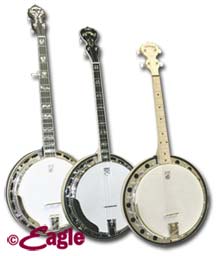More on Deering Banjos
The term "long neck" can be very confusing when talking with 5-string and 4-string banjo players because to the 5-string player a long neck banjo has twenty-five frets, three more than a standard 5-string banjo and is open-back (has no resonator) - as pictured on page 23 of the Deering catalogue. To a 4-string banjoist a long neck banjo is the same as a plectrum banjo with 22 frets, simply longer as compared to a tenor banjo which only has 19 frets. And so, the term "long neck" can refer to either the 5-string or 4-string banjos with a completely different meaning.
The 6-string banjos were used in the early 1900's in some of the jazz bands but they never really caught on because the sound wasn't quite right. Deering are the only makers today who have mastered the 6-string banjos to bring out a wonderful banjo tone and make the instrument a joy to play. Many guitar players are now discovering the new sound available from playing a Deering 6-string banjo. Anything you play on a guitar can also be played on the 6-string banjo. It can be flat-picked or finger-picked equally well. We string it with extra light acoustic guitar strings, however it does perform well with other string gauges. The sound is excellent! John Sebastian (Loving Spoonful) chose the Deering Boston six string for playability, tone and volume.




